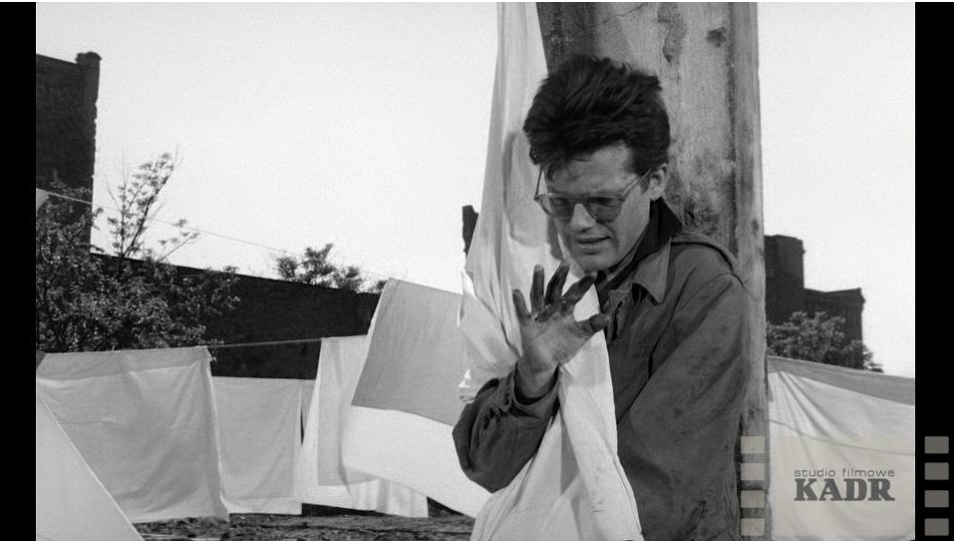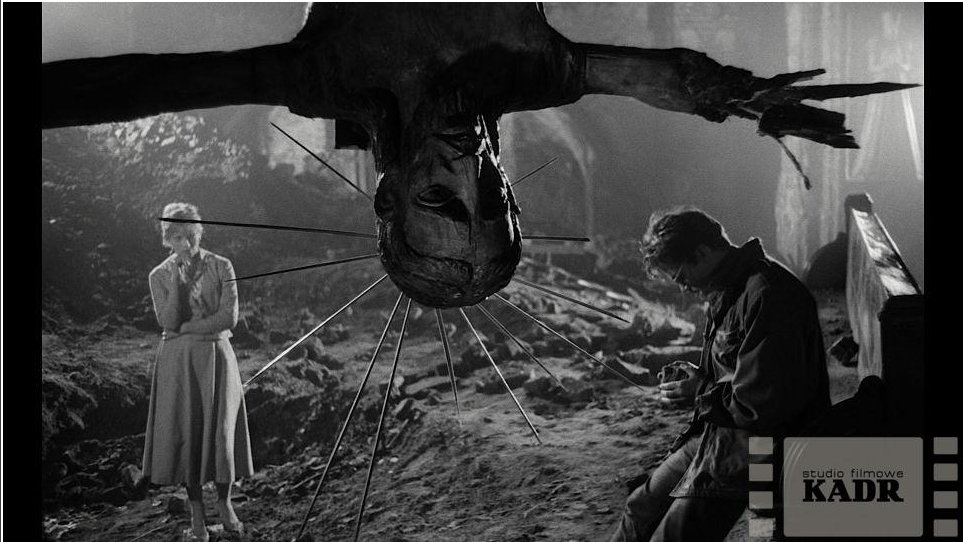Ashes and Diamonds (Polish Title: Popiół i diament )
Director: Andrzej Wajda
Drama, Romance, War
Poland
1958
Polish with English subtitles
99min
Black and White
Rating: PG
Trailer
On the last day of World War II in a small town in Poland, Polish exiles of war and the occupying Soviet forces confront the beginning of a new day and a new Poland.
A masterpiece of international cinema and the landmark of the “Polish Film School”, Ashes and Diamonds is about tragic romantic hero, Maciek (played by legendary Polish actor, the late Zbigniew Cybulski), who has been ordered to assassinate an incoming commissar. Torn between duty to the national cause and the yearning for a normal life, his progress is stalled which leads him to Krystyna (Ewa Krzyżewska), a beautiful barmaid who gives him a glimpse of what his life could be.
Beautifully photographed and brilliantly performed, Wajda’s film presents the political and moral conflicts of 1945 shown through the tragedy of a young Home Army soldier who is forced to follow an order against his conscience. Ashes and Diamonds masterfully interweaves the fate of a nation with that of one man, resulting in one of the most important Polish films of all time.
Awards
Warsaw Golden Duck (awarded by Film magazine)
IFF, Venice FIPRESCI Award
IFF, Vancouver Award of the Canadian Federation of Film Societies Award
IFF, Berlin Silver Laurel of D.O. Selznick
IFF, Ibadan Diploma of Recognition
France Crystal Star- Award of the French Film Academy (Ewa Krzyżewska)
IFF, Addis Ababa Honorary mention
Crew
Director: Andrzej Wajda
Screenwriters: Jerzy Andrzejewski, Andrzej Wajda
Cinematographer: Jerzy Wójcik
Designer: Roman Mann
Costumes: Katarzyna Chodorowicz
Editor: Halina Nawrocka
Cast
Zbigniew Cybulski
Ewa Krzyżewska,
Wacław Zastrzeżyński,
Adam Pawlikowski,
Bogumił Kobiela
Andrzej Wajda
MASTER OF WORLD CINEMA
Andrzej Wajda was born in 1926 in Suwałki, Poland, the son of a school teacher and an army officer. Wajda’s father was murdered by the Soviets in 1940 in what came to be known as the Katyn massacre. In 1942 he joined the Polish resistance and served in the Armia Krajowa. After the war, he studied to be a painter at Kraków’s Academy of Fine Arts before entering the Łódź Film School. After his apprenticeship to director Aleksander Ford, Wajda was given the opportunity to direct his own film: A GENERATION (1955).Throughout his film career, Wajda has simultaneously worked as a director in theatre. His acclaimed productions include versions of Shakespeare’s Hamlet, Antigone and a unique interpretation of Dostoyevsky’s Crime and Punishment.
In 2016, Polish director Andrzej Wajda celebrated his 90th birthday and 65th feature film: AFTERIMAGE. Wajda passed away the same year on 9th October 2016 having successfully forged a prolific film career spanning over 60 years.
Wajda’s contribution to cinema has been recognized by the Academy Awards (Honorary Oscar in 2000), European Film Awards (Lifetime Achievement, 1990), Berlin Film Festival (Golden Bear for Lifetime Achievement, 2006), and many others.
Four of his films have been nominated for the Academy Award for Best Foreign Language Film: THE PROMISED LAND (1975), THE MAIDS OF WILKO (1979), MAN OF IRON (1981), and KATYN (2007). MAN OF IRON won the coveted Palme d’Or at the Cannes Film Festival. Wajda has directed films from many genres, but he began his career with a trilogy of anti-war films: A GENERATION (1954), KANAL (1957, Cannes - Special Jury Prize) and ASHES AND DIAMONDS (1958). He has made many films set during or dealing with post World War II, including KORCZAK (1990), a story about a Jewish-Polish doctor who cares for orphan children, HOLY WEEK (1995) specifically on Jewish-Polish relations, and KATYN (2007) about the Katyn massacre, in which Wajda’s own father was murdered.
Wajda’s commitment to Poland’s Solidarity movement was manifested in Palme d’Or winner MAN OF IRON with Solidarity leader Lech Wałęsa appearing as himself. The director’s involvement in this movement would prompt the Polish government to force Wajda’s production company out of business. Three decades later, Wajda made the biopic WALESA, MAN OF HOPE (European Film Awards - FIPRESCI Prize of the Year).
Wajda’s other credits include 1983’s post-French Revolution epic DANTON, starring Gérard Depardieu, 1980’s THE ORCHESTRA CONDUCTOR, starring John Gielgud; 1983’s A LOVE IN GERMANY (1983) featuring Hanna Schygulla, and 1988’s THE POSSESSED (1988) based on Dostoyevsky’s novel.
Award-winning director of photography Pawel Edelman has been one of Wajda’s great collaborators. They worked together on several films, including AFTERIMAGE, Walesa MAN OF HOPE, PAN TADEUSZ (1999) SWEET RUSH (Alfred Bauer Prize at the Berlin International Film Festival in 2009) and Wajda’s 1994 film version of Dostoyevsky’s novel THE IDIOT.
Filmography
Films:
– Pokolenie (Generation) 1954 (Polish State Prize);
– Idę do Słońca (I`m Going to the Sun) 1955;
– Kanał (Canal) 1957 (Jury Special Award – Silver Palm, Cannes IFF 1957);
– Popiół i diament (Ashes and Diamonds) 1957 (FIPRESCI Prize Venice IFF 1959, D. O. Selznick`s Silver Laurel Award 1962);
– Lotna 1959;
– Niewinni czarodzieje (Innocent Sorcerers) 1960;
– Samson 1961;
– Sibirska Ledi Makbet (Siberian Lady Macbeth) 1962;
– L`amour a Vingt Ans (Love at Twenty) 1962;
– Popioły (Ashes) 1965;
– Gates to Paradise 1968;
– Wszystko na sprzedaż (Everything for Sale) 1969;
– Polowanie na muchy (Hunting Flies) 1969;
– Krajobraz po bitwie (Landscape After the Battle) 1970 (Golden Globe Milan 1971);
– Brzezina (The Birch Wood) 1970 (FIPRESCI Milan IFF 1970, Golden Medal Moscow IFF 1971);
– Wesele (The Wedding) 1973 (Silver Shell San Sebastian IFF 1973);
– Ziemia obiecana (The Promised Land) 1975 (Gdańsk FF Golden Lions 1975, Golden Medal Moscow IFF 1975, Oscar® Award Nomination 1976);
– Człowiek z marmuru (Man of Marble) 1977 (FIPRESCI Prize, Cannes IFF 1978, Jury Special Prize, Cartagena IFF 1980);
– Bez znieczulenia (Without Anesthesia) 1978 (OCIC Prize, Cannes IFF 1979);
– Panny z Wilka (The Maids of Wilko) 1979 (Oscar® Award Nomination 1980);
– Dyrygent (The Conductor) 1980;
– Człowiek z żelaza (Man of Iron) 1981 (Palme d`Or - Golden Palm Cannes IFF 1981, Oscar® Award Nomination 1982);
– Danton 1982 (Prix Luis Delluc 1982);
– Eine Liebe in Deutchland (A Love in Germany) 1983;
– Kronika wypadków miłosnych (Chronicle of Love Affairs) 1986;
– Les Possedes (The Possessed) 1987;
– Korczak 1990;
– Pierścionek z orłem w koronie (The Crowned-Eagle Ring ) 1992;
– Nastasya 1994;
– Wielki Tydzień (The Holy Week) 1995 (Silver Bear, Berlin IFF 1996);
– Panna Nikt (Miss Nobody) 1996;
– Pan Tadeusz (Mr Tadeusz) 1999;
– Zemsta (The Revenge) 2002;
– Katyń (Katyn) (2007), (Eagle Prize - Polish Film Academy Award, Best Film 2007; Oscar® Award Nomination 2008, European Film Academy Prix d’Excellence 2008);
– Tatarak (Sweet Rush) (2009), (Alfred Bauer Prize for the Innovativeness –
Berlin IFF 2009, European Film Academy Prix FIPRESCI 2009);
– Wałęsa. Człowiek z nadziei. (Walesa. Man of Hope) (2013) – Pirandello Prize Venice IFF 2013.
Prizes:
– State First Class Prize 1974;
– Order of the Banner of Labor (second class) 1975;
– Konrad Swinarski Prize 1976;
– Premio David di Donatello Luchino Visconti, Italy 1978;
– Officer’s Cross of Order of Polonia Restituta;
– Order of Kirill and Methodus (first class), Bulgaria 1978;
– BAFTA Fellowship 1982;
– Onassis Prize, Greece 1982;
– Oficier, Legion d`honneur 1982 France;
– Cesar Award, France 1983;
– Pirandello Artistic Award, Italy 1986;
– Kyoto Prize, Japan 1987;
– Felix European Film Award – Lifetime Achievement Award 1990;
– Order of Rising Sun, Japan 1995; Premium Imperiale, Japan 1997;
– Golden Lion Life Achievement Award, Venice IFF, 1998;
– OSCAR® American Film Academy - Lifetime Achievement Award 2000;
– Commandeur, Legion d`honneur France 2001;
– Golden Bear Life Achievement Award, IFF Berlin 2006;
– European Film Award Prix FIPRESCI 2009.






